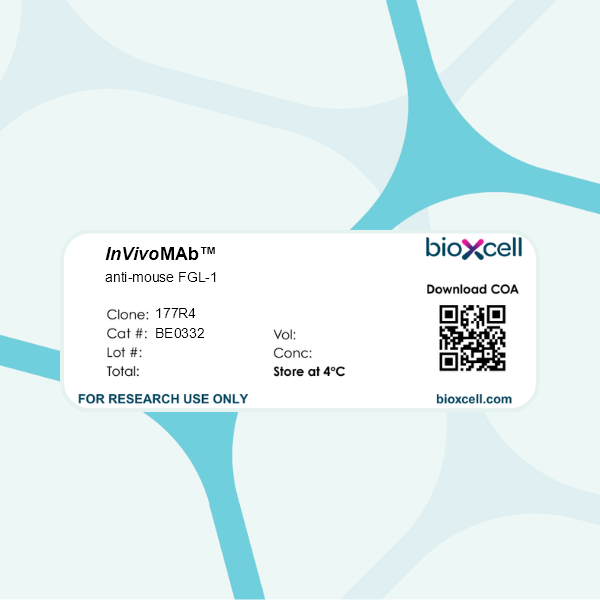InVivoMAb anti-mouse FGL-1
Product Description
Specifications
| Isotype | Rat IgG2a, κ |
|---|---|
| Recommended Isotype Control(s) | InVivoMAb rat IgG2a isotype control, anti-trinitrophenol |
| Recommended Dilution Buffer | InVivoPure pH 7.0 Dilution Buffer |
| Conjugation | This product is unconjugated. Conjugation is available via our Antibody Conjugation Services. |
| Immunogen | Murine FGL-1-Ig fusion protein |
| Reported Applications |
in vivo FGL-1 blockade in vitro FGL-1 blockade Flow cytometry Immunohistochemistry (paraffin) |
| Formulation |
PBS, pH 7.0 Contains no stabilizers or preservatives |
| Endotoxin |
≤1EU/mg (≤0.001EU/μg) Determined by LAL assay |
| Purity |
≥95% Determined by SDS-PAGE |
| Sterility | 0.2 µm filtration |
| Production | Purified from cell culture supernatant in an animal-free facility |
| Purification | Protein G |
| RRID | AB_2894752 |
| Molecular Weight | 150 kDa |
| Storage | The antibody solution should be stored at the stock concentration at 4°C. Do not freeze. |
| Need a Custom Formulation? | See All Antibody Customization Options |
Application References
in vivo FGL-1 blockade
in vitro FGL-1 blockade
Flow Cytometry
Immunohistochemistry (paraffin)
Wang, J., et al (2019). "Fibrinogen-like Protein 1 Is a Major Immune Inhibitory Ligand of LAG-3" Cell 176(1-2): 334-347 e312.
PubMed
Lymphocyte-activation gene 3 (LAG-3) is an immune inhibitory receptor, with major histocompatibility complex class II (MHC-II) as a canonical ligand. However, it remains controversial whether MHC-II is solely responsible for the inhibitory function of LAG-3. Here, we demonstrate that fibrinogen-like protein 1 (FGL1), a liver-secreted protein, is a major LAG-3 functional ligand independent from MHC-II. FGL1 inhibits antigen-specific T cell activation, and ablation of FGL1 in mice promotes T cell immunity. Blockade of the FGL1-LAG-3 interaction by monoclonal antibodies stimulates tumor immunity and is therapeutic against established mouse tumors in a receptor-ligand inter-dependent manner. FGL1 is highly produced by human cancer cells, and elevated FGL1 in the plasma of cancer patients is associated with a poor prognosis and resistance to anti-PD-1/B7-H1 therapy. Our findings reveal an immune evasion mechanism and have implications for the design of cancer immunotherapy.
Product Citations
-
-
Cancer Research
IL-6 promotes metastasis and EMT of non-small cell lung cancer cells by up-regulating FGL1 via STAT3 pathway.
In Transl Cancer Res on 30 July 2025 by Liu, J., Liu, Q., et al.
PubMed
It has been reported that IL-6 induces the synthesis and secretion of fibrinogen-like protein 1 (FGL1) in liver cells as well as promotes the regeneration of liver cells. FGL1 is upregulated in human cancers, especially in non-small cell lung cancer (NSCLC). FGL1 is involved in the regulation of epithelial-mesenchymal transition (EMT) in gastric cancer (GC) cells. However, the role of IL-6/FGL1 signaling axis in the EMT process of NSCLC cells and its mechanism remain unclear. In this study, we investigated the role of FGL1 in mediating the metastasis and EMT processes of NSCLC cells, as well as the underlying signaling mechanisms.
-
-
-
Cancer Research
-
Immunology and Microbiology
Yap methylation-induced FGL1 expression suppresses anti-tumor immunity and promotes tumor progression in KRAS-driven lung adenocarcinoma.
In Cancer Commun (Lond) on 1 November 2024 by Jiang, J., Ye, P., et al.
PubMed
Despite significant strides in lung cancer immunotherapy, the response rates for Kirsten rat sarcoma viral oncogene homolog (KRAS)-driven lung adenocarcinoma (LUAD) patients remain limited. Fibrinogen-like protein 1 (FGL1) is a newly identified immune checkpoint target, and the study of related resistance mechanisms is crucial for improving the treatment outcomes of LUAD patients. This study aimed to elucidate the potential mechanism by which FGL1 regulates the tumor microenvironment in KRAS-mutated cancer.
-
-
-
Cancer Research
-
Genetics
ALKBH5 enhances efficiency of anti-PD-1/PD-L1 therapy by reducing Lnc-XIST/miRNA- 124-3p mediated FGL1 expression in bladder cancer
In Research Square on 11 October 2022 by Xia, Y., Jiang, X., et al.
-

